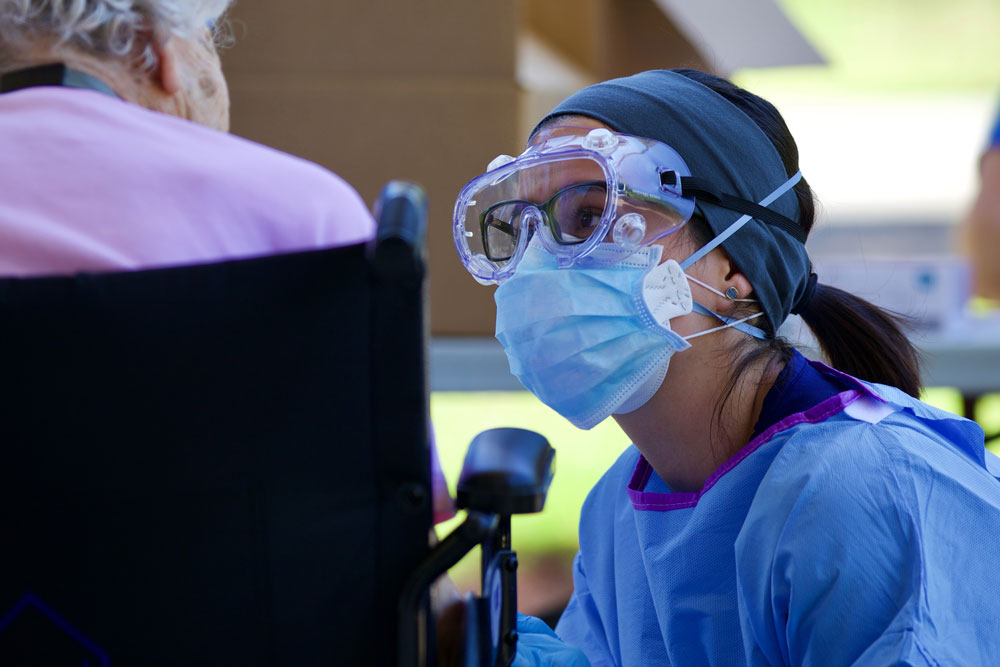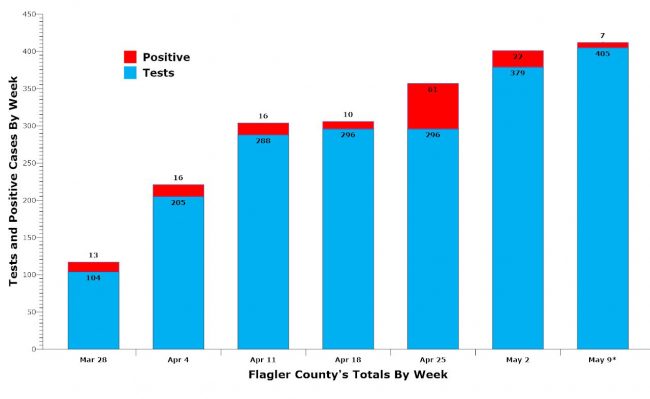
As Flagler County moves toward reopening in step with the state and the nation, testing for the coronavirus will be just as important, if not more so, than it’s been in the past two months, Flagler County’s public health and emergency management officials say.
“My feeling is until this thing is really under control, pretty much anybody with any kind of cold-like symptom should be testing,” Flagler Health Department Medical Director Stephen Bickel says. “Everybody should be getting tested because there’s enough of it out there that there’s a significant chance that a cold symptom person–that’s the cause.”
Referring to a call on Wednesday with Dr. Scott Rivkees, the state surgeon general, Bob Snyder, director of the Flagler Health Department, the emphasis was on “testing, testing and testing,” Snyder said. “The other thing that the surgeon general mentioned is that we want every county to test 2 percent of their population by the end of May.”
But as with so many different aspects of the coronavirus emergency, there is some confusion about how much testing should take place and whether it will be available to the extent recommended as society reopens. The 2 percent guideline from the federal government is a monthly goal, not an overall goal. And AdventHealth this week and next is closing most of its drive-up testing locations in central Florida as its staff returns to normal assignments.
AdventHealth Palm Coast staff and volunteers took the lead, running the drive-up location at Daytona State College last month. The hospital’s involvement helped increase testing overall. But the hospital’s involvement will end next week, AdventHealth Palm Coast Chief Operating Officer Wally de Aquino said on WNZF this morning. “AdventHealth will continue to support the county until the end of next week, and then we’re going to transition the lead again to Jonathan Lord’s team and we will support them as much as we can,” de Aquino said.
AdventHealth’s drive-up location at the International Speedway in Daytona Beach closed today after conducting some 5,000 tests. Advent’s various testing sites conducted 20,000 tests collectively, with a positivity rate of 2 percent. Locations at the Mall of Millenia in Orlando, Lake Sumter State College in Leesburg and a location at Posner Park in Davenport are closing Friday, and a site at Kissimmee Heritage Park closes May 11.
Lord, Flagler’s emergency management chief, says his intention is to keep the testing site going any way possible. “We’re going to keep doing it, we have no goal to stop doing it, I don’t have any end date,” Lord said in an interview. But, he noted, “our demand–I don’t want to say is diminishing, but it’s not increasing any more.”

This is happening even though the criteria for testing have changed significantly, allowing anyone with any symptom in a very long list of symptoms to get a test, as long as it’s scheduled in advance. Previously, criteria were much more strict, with individuals needing to have several symptoms or be in certain age or professional groups to qualify for a test. The changed criteria are one reason why the proportion of people testing positive has fallen. Another reason, local officials believe, is that the social distancing in April appears to have worked to Flagler’s advantage.
“We’ll work with Jonathan Lord, we’ll work with all our volunteers with the health department, we’ll probably go back to something similar to the operation the first two weeks that we did testing,” Snyder said. In each of those weeks, the Department of Health recorded a total of 296 tests in Flagler County, including the drive-up location, walk-in clinics and the health department, which has the capacity to test 25 to 30 people a day. “I really think our little army that we created five weeks ago, that won’t be a problem. We don’t see it as a problem. We’ve got the supplies, we’ve got the PPE.” (PPE is the acronym for personal protective equipment.)
On Friday alone, the health department’s “strike teams” are expecting to test 300 residents and staff members of local assisted living and memory care facilities.
Snyder, Bickel, Lord and De Aquino all speak in one measure or another of the essential place testing will keep in months ahead as an effective means of detection and control of flare-ups, clusters or broader issues that could lead to yet more changes in how–or even whether–opening steps are carried out.
The emphasis on testing is in line with the Trump administration last week said that the aim is to give states the ability to test at least 2 percent of their population per month. Admiral Brett Giroir, the assistant secretary for health, specified the 2 percent target in a television interview last week. That’s 6.6 million people a month in the nation, 430,000 in Florida, and 2,300 in Flagler County (based on a population of 115,000, the latest estimate by the Census Bureau).
So far, just under 2,000 people have been tested in the county since the beginning of the emergency in March, with a cumulative positivity rate of 7 percent. The rate is under 4 percent in the tests conducted and reported so far since April 24. It’s not clear how the county would manager to test 2,300 people a month in future months if the testing locations are limited, and if individuals themselves are not registering to get tested. Some businesses, such as the hospital, which has a staff of about 1,000, will be systematically testing all staff and all patients on a revolving basis.
If individual residents dry up for testing, “I would imagine we’d have a discussion on loosening the test criteria, but we’ll kind of deal with that when we get there,” Snyder said.
There are other confusing factors that may cloud the accuracy of testing numbers. Some residents get tested more than once. While positive results are attributed to only one individual when the numbers are posted on the Florida Department of Health’s dashboard, the same is not be true of negative tests: a first responder could be tested every few weeks, be negative every time, and each of those tests would be counted, cumulatively, as individual tests on the dashboard. With health care facilities now instituting widespread and recurring testing for staff and patients, that would inflate the number of tests relative to the population at large, improving the overall percentage of the population tested even though the true rate would not accurately proportional.
The Florida Health Department’s numbers have reflected similar flaws since the department’s dashboard was made public. For instance, as of today, Florida had nearly 39,000 cases positive for Covid-19. But the number is cumulative going back to the earliest cases in February. Flagler’s total, as of today, was 145, an increase of three over yesterday. The lower proportion of positive cases relative to people tested pushed Flagler’s rate below the target range officials see as the threshold making reopening possible, though Lord cautions that the truer number of positive cases in the county is likely closer to “thousands.”
The state has seen at least 6,765 hospitalizations as a result of Covid-19, 15 of them in Flagler. Again, the numbers are cumulative since the beginning of the emergency–and includes the number of people who have been hospitalized and have died. As of today, 1,600 Floridians have died of the disease, 20 in the last 24 hours of reporting by the department of health. The department is not releasing figures indicating how many people have been released from hospital.
Nor is it indicating how many have recovered, though health officials are having difficulties defining what counts as a recovery: Covid-19 is an especially vicious virus,with some patients needing rehabilitation after their discharge from hospitals and others, affected less severely, still feeling various effects from the illness weeks after its peak symptoms.
Meanwhile, the Flagler health department’s strike teams have been visiting every one of the county’s 71 assisted living and nursing home facilities to ensure that they are abiding by coronavirus-related safety measures and have the equipment to do so. Such facilities have been cauldrons of viral activity in some parts of the state, with 1,700 residents and 1,637 staff members testing positive, and 1,634 residents transferred out of facilities because of their status. Statewide, 577 residents and staff members at those facilities have died of the disease.
Flagler County has managed to avoid serious issues at its facilities, with just two staff members at two different facilities so far testing positive. In comparison, 12 residents and 15 staff members have tested positive at six facilities in Volusia. Counties further south have been struck more severely by outbreaks.





























Jimbo99 says
Nice graph, thanks for ruining people’s lives financially. Couldn’t they have rolled these programs out, data reporting & drive thru/up testing without shutting down the world ?
WhackAMole says
Just another example of, nothing to see here, move it along. Right in step with the delusional WH and GOV. It is too exhausting anymore to care…it is what it is, nothing can be done about it anymore. Forget the testing for COVID then and buy some good antibody test kits, like the ones from Roche. Find out if 99% of us had it and create a wall of immunity around those that didn’t. Antibody testing is the way to go now.
Bob Z says
It would great to see antibody testing offered to anyone that suspects they might have had it in the past.
Derrick Redder says
Maybe the folks running the show could actually have a site for county Residents to be tested for the China 19 AND the Antibodies testing.
God knows we have plenty of parking lots that are unused. There is no reason why we resident / taxpayers have to drive to another county or it’s fairgrounds to be have testing done.
Either lead or at least follow . It’s easy to go to an assisted living facility to jackup the numbers just like shooting fish in a barrel, or saying you opened up the beach but close off the parking so no one can use it.
Where’s Mullins to throw some light onto this matter.
Until such time as testing is open to all our residents testing those who are in assisted living and or have underlying conditions does what good,? They are all contained and not out in public.